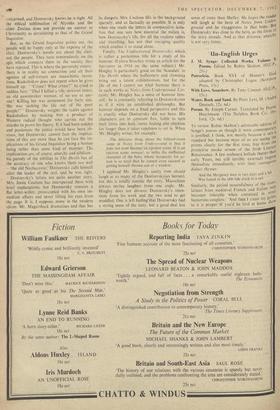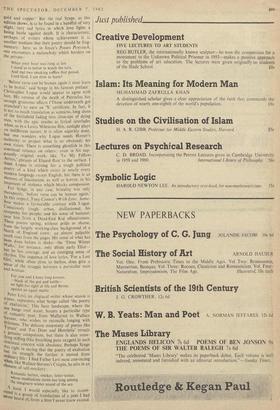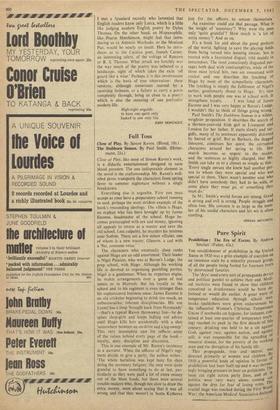Un-English Urges
To review Robin Skelton's admirable edition of Synge's poems as though it were contemporarY is justified, I think, not merely because it sets a standard but because most of us are seeing the poems clearly for the first time, free from the protective smoke screen of the Irish Literary Renaissance. A few seaboard ballads (better than early Yeats, but still terribly external) impose themselves immediately, with their outrageous dialect rhymes:
And the Mergency man in two days and a bit Was found in the ebb tide stuck in a net.
Similarly, the period mournfulness of the trans- lations from medieval French and Italian only becomes tolerable when contained in semi' humorous couplets: 'And then 1 count my gains' as it is proper/If you'd be lord at home show
gold and copper.' But the real Synge, as this edition shows, is to be found in a handful of very
slight, very sad lyrics in which love fights a losing battle against death. It is characteristic, perhaps, of writers whose achievement is another medium that their poetry should be frag- -Mentary: here, as in Joyce's Pontes Penyeach, one encounters a melancholy which borders on the private: When your hour was rung at last I stood as in terror to watch the turn,
And met two creaking coffins that passed. Lord God, I am slow to learn!
`Before verse can he human again it must learn to be brutal,' said Synge in his famous preface ! Christopher Logue would appear to agree with him. His version of the death of Patroclus has enough gruesome effects (Those underneath got crunched') 'to earn an 'X' certificate. In fact, it is not so much translation as scenario, long shots.
Of the battlefield fading into close-ups of dying men, with the epic similes as lyrical interludes When as in a Lewis Milestone film, sunlight plays
on indifferent nature..It is often superbly done, but one wonders why Logue needs Homer's authority to project what is so obviously his
own vision. There is something ghoulish in this continual reliance on others: even in his sup- posedly original work, like `To My Fellow Artists,' phrases of Eluard float to the surface. I think Logue is striving for a tough political poetry of a kind which exists in nearly every
modern language except English. but there is an element of fascination, as well as horror, in his treatment of violence which blocks compassion. For Synge, in any case, brutality was only therapeutic. 'before verse can be human again.' In this respect, Tony Connor's With Love, Some- h°w makes a favourable contrast with Logue. Consciously tough. urban, disillusioned, his sYmpathy for people, and his sense of humour, rae him from a Dead-End Kid offensiveness. ese Poems spring, without pride or shame. from the largely working-class background of a
North of England town : an almost palpable murk rises from the pages. His sense of what has been done before is shaky—the 'Three Winter
Walks,' for instance, only dilute early Eliot—
but he has courage, and an emerging sense of rhythm. The sequence of love lyrics, 'For a Lost
Girl,' while often close to bathos, does give a sense of the struggle between a particular man
and woman : For you and I have long known,
--black of the pot and kettle—
we fight for right of life and throne against an equal mettle.
Peter Levi, an elegiacal writer whose season is winter, represents what Synge called the poetry
of exaltation.' This bare landscape, where the
sun bangs over water, haunts a particular type Stevens,r romantic poet, from Mallarme to Wallace t who wishes to reconcile longing with strictness. The delicate monotony of poems like Futures and 'For Dom and Henrietta' reveals a t. _genuine compulsion, but there is also some- thing stifling (like breathing pure oxygen) in such was concern with absolutes. Perhaps Synge
lost right in saying that the poetry of exaltation
lora. its strength the further it moved from °J1lnary life : I find Father Levi most convincing "en, like Wallace Stevens's Crispin, he stirs in an element of self-mockery :
Romantic hermit, smoker, letter-writer,
whose meditations move too long among the imaginary winter sound of the sea. rhA_,book I would especially like to recom- ... U is a group of translations of a poet I had "Yet heard of, from a firm I never knew existed. I met a Spaniard recently who lamented that English readers knew only Lorca, which is a little Like judging modern English poetry by Dylan Thomas. On the other hand, an Hispanophile, like ,Pearse Hutchinson, might feel that intro- ducing us to Antonio Machado, or the Mexican Paz, would be nearly an insult. Here he intro- duces us to the Catalan poet, Joseph Garner, an interesting talent, of the voltage of Ransom or R. S. Thomas. What struck me forcibly was the way much of the poetry was tethered to a landscape, sight of which takes the exile 'off guard like a wine.' Perhaps it is this involvement which is the basis of true observation : these versions, although sometimes marred by a caressing lushness, or a failure to carry a poem completely through, bring us close to a poetry which is also the meaning of one particular modern life.
High-night anguish: to have one spirit only locked in one only life.
JOHN MONTAGUE








































 Previous page
Previous page